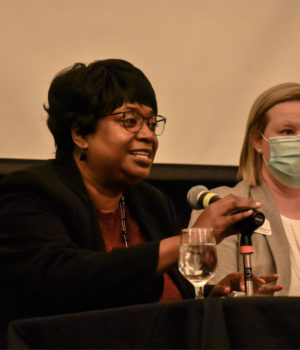Written by Alexis Barton
On Tuesday, November 9th, a panel of leaders from the Roanoke College community came together to share their experiences of failure, success, and everything in between with students in the Wortmann Ballroom. The event was brought to campus by Omicron Delta Kappa, a leadership honor society at Roanoke. The panel consisted of ODK alumni who are current members of the Roanoke community, including President Michael Maxey, Vice President for Community, Diversity, and Inclusion Teresa Ramey, Assistant Dean of Students Amy Perkins, and Dr. Dolores Flores-Silva, a professor of Spanish.
Each panelist was given the opportunity to share about their greatest successes, failures, and the moments where they were challenged to grow as leaders. Vice President Ramey started off the event by telling the audience about her life as the oldest child in her family. Like many young children, Ramey noted that her early thoughts revolved around her own wants and needs. As she grew older, she started to understand the importance of taking the needs of others into consideration. Though a simple example of how leaders are shaped, Ramey’s experience highlighted the attributes of an engaged, connected leader. Ramey also shared a particular experience from her college years when she was the president of the United Black Students Association. She shared that, “Part of leadership has to do, sometimes, with saying things and stepping up when no one else will”. Hearing Ramey’s experience with advocacy in a campus setting was particularly poignant as her new position with the College is paving a way to make Roanoke’s campus more inclusive and united from an administrative level.
Dean Amy Perkins shared two key points with the audience, one of which was an experience from her time at Roanoke as a student. As an executive member of her sorority, Perkins was given the responsibility of facilitating standards meetings. She shared a key memory of when one of the younger sisters in the chapter came to the meeting visibly nervous and brought another sister with her for support. At the time, this went against the standards of the procedure, so Perkins and her fellow sisters on the board stopped both girls from entering the room. Perkins had what she describes as a lightbulb moment when she realized, “To put it in the words of your generation, ‘it’s not that deep’”. In that moment, Perkins chose flexibility and empathy over tradition and prioritized the comfort of her fellow sister. Perkins shared that there are moments as a leader where you have to be willing to bend the rules to conform to the needs of those you are leading. Perkins was practicing a concept that she later learned in the fall of 2020, the idea of “radical generosity”. Perkins highlighted that this notion revolves around empathy and understanding, which are attributes in her definition of an effective leader.
Dr. Flores-Silva decided to take a slightly different approach and share her experiences as a leader through a short story. It began with her childhood in Mexico, where she learned from a young age the importance of putting the needs of others before your own. Flores-Silva learned through the example of her grandmother, who actively sought out ways to serve her neighbors through physical care and healing. These experiences shaped her as she grew into a young adult. When she attended university, Flores-Silva was an active student who created several initiatives to serve her community, including collecting books to bring to young children in rural areas. The experiences that she had from a young age influenced Flores-Silva’s leadership capabilities later in life, where she had to actively make decisions in several instances where she knew she must do what was right for her community. She also shared that diversity and inclusion is a key role of effective leadership, and it inspires her to see students taking on this role within the campus community.
The panel closed with President Maxey, a prime example of what many students on campus view as an effective, engaged leader. President Maxey gave students an acronym to describe the goals that he set for himself when he became the president of the College: CHEEG. Though Maxey admitted himself that it was not the most memorable pneumonic, his message was impactful nonetheless. The acronym stands for curiosity, humility, ego, empathy, and gratitude. Though these were goals that President Maxey set for himself personally, they are attributes that are applicable to all leaders. He also gave the example of the circular table that sits in his office. The table serves as a daily reminder to the president to include those around him that support his initiatives, challenge himself to stay curious about new areas of change, and to stay grateful for his remaining time as the president of the College.
Each of the panelists provided unique insights into their experience as leaders, and students were able to leave with new perspectives on what it means to be an effective leader.




